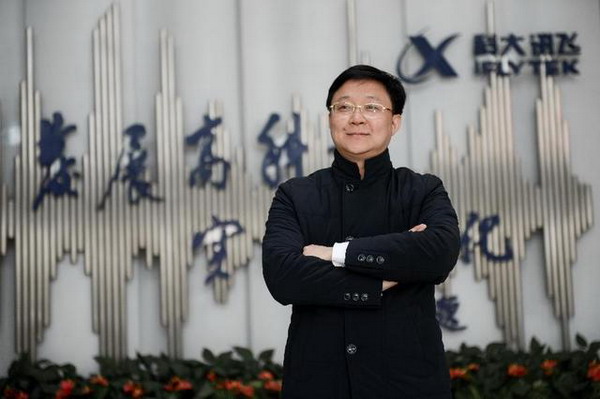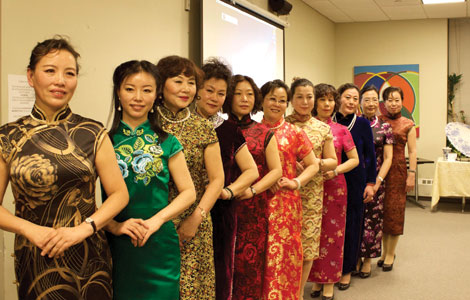How ambition turned a student into entrepreneur
Updated: 2015-03-11 10:58
By ZHANG YI(chinadaily.com.cn)
|
||||||||
 |
|
Liu Qingfeng, chairman of USTC iFlytec and a deputy in the National People's Congress. [Photo / tech.qq.com] |
When Liu Qingfeng was a first-year PhD student 15 years ago, dreams of making piles of money were the last thing on his mind. Instead his driving ambition was to set up in China the equivalent of Bell Laboratories, the world famous research and development company connected to the inventor of the telephone, Alexander Graham Bell.
In fact Liu's enthusiasm for such an idea was so strong that five of his fellow students at the University of Science and Technology in Hefei, capital of Anhui province, soon threw in their lot with him to form an information technology company, USTC iFlytec.
"I realized then that speech recognition and synthesis technology would be the bridge between humans and electronic devices such as mobile phones," Liu says.
"Speech application software would be widely used – in things such as phones, toys and navigation devices – and one day it would be possible to seamlessly communicate with robots.
"So after graduating with a master's degree I turned down dozens of job offers, even with six-figure salaries, and threw myself into developing this voice recognition software."
With the hard work of Liu and his 18-strong team over a decade, USTC iFlytec, whose flagship product is voice-recognition software, now has market capitalization of more than 33 billion yuan ($5.2 billion).
That hard work has not only given voice recognition to the world but itself gained global recognition, winning the top prize in the Blizzard Challenge, a voice synthesis test devised by researchers in the United States and Japan, for the past nine years. In addition, USTC iFlytec's software is the most popular in china of its kind, used by 1 in 10 people on the planet, a total of 600 million users.
The software's long supremacy in the Blizzard Challenge seems particularly apt given the hard times its patrons had to endure as they nurtured their big idea from the laboratory to the market place.
"In the early stages, for five straight years, we were losing money hand over fist, and I felt like I was slowly being cooked in a frying pan," Liu says.
Even the company's top people were forced to live on a shoestring salary, he says, and he, as CEO, was paid 3,000 yuan a month for the first couple of years, and sometimes employees were paid with borrowed money.
In the second year, the founders took stock of where the company stood, and several decided to pull out, but most remained convinced that if they could only hold on, their speech recognition software had a great future. Even as investors' doubts grew, those left in the company pressed on with their research.
Last year the company reaped net profit of 385 million yuan, 38 percent higher than in the previous year. Now, free of money worries, Liu and his team are working on a program called Super Brain, something they hope can match or even better IBM's Watson and Google Brain.
On March 4, iFlytec and Jingdong, a major Chinese online retailer, announced that they are collaborating in developing intelligent home appliances. The two pioneers in their fields will set up a firm with investment of 150 million yuan and make products that can understand human speech.
"In the next few years people are going to be able to control home appliances such as their TVs, microwaves and airconditioning simply by talking to them," Liu says.
Liu, a deputy in the National People's Congress, sees a bright future for the intelligent technology industry in China and urged the annual session of the congress to make plans for the industry comparable to those of the Brain Initiative in the US and the Human Brain Program of the Europe Union.
"As China loses its competitive advantage in producing low-end products, the success of its economic transformation will largely depend on the growth of businesses rich in technology. Intelligent technology is one industry that can help the country maintain continuous economic growth."

 Scroll revives cheongsam beauty in New York
Scroll revives cheongsam beauty in New York
 Apple unveiled 1st wearable watch
Apple unveiled 1st wearable watch
 Sports stars in 10 dead in Argentina plane crash
Sports stars in 10 dead in Argentina plane crash
 Iditarod Trail Sled Dog race paves a new way
Iditarod Trail Sled Dog race paves a new way
 'You're on fire' - witness recalls Boston blast
'You're on fire' - witness recalls Boston blast
 55 passengers injured in US truck-train collision
55 passengers injured in US truck-train collision
 Children perform 'Ballad of Mulan' in NYC
Children perform 'Ballad of Mulan' in NYC
 Rally in New York supports indicted Chinese-American police officer
Rally in New York supports indicted Chinese-American police officer
Most Viewed
Editor's Picks

|

|

|

|

|

|
Today's Top News
China to give 10-year visas to Canadians
China now No. 3 defense importer
Deal reflects new 'superhero' world
China wooing talent back home
US slaps tough sanctions on Venezuelan officials
Xiaomi to enter Brazilian market
Clinton remains silent as questions mount over email scandal
Prince Charles, Camilla to visit Washington-area sites
US Weekly

|

|







